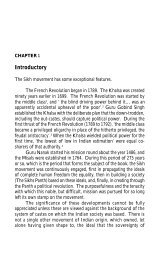Fundamentalism and the Sikh Religious Tradition by T.N. Madan
Fundamentalism and the Sikh Religious Tradition by T.N. Madan
Fundamentalism and the Sikh Religious Tradition by T.N. Madan
Create successful ePaper yourself
Turn your PDF publications into a flip-book with our unique Google optimized e-Paper software.
two riparian states, namely, Karnataka <strong>and</strong> Tamil Nadu, regarding <strong>the</strong>ir river rights; <strong>and</strong><br />
yet never has a Congress Ministry of Punjab, or, for that matter, <strong>the</strong> Centre considered it<br />
necessary to object to this drain of water <strong>and</strong> power from Punjab to <strong>the</strong> non-riparian<br />
states. And when <strong>the</strong> Dharam Yudh morcha was started, <strong>the</strong> Centre found itanecessary to<br />
make <strong>the</strong> army attack as a justified measure, to sidetrack <strong>the</strong> real problem. Could any<br />
secular Administration in India or outside, think of justifying an attack on Somnath,<br />
Vatican in Rome, or <strong>the</strong> Temple at Jerusalem ? Even a colonial government held a public<br />
enquiry, censured Dyer <strong>and</strong> removed <strong>the</strong> Governor, when 1300 persons were killed at <strong>the</strong><br />
Jallianwala Bagh. But over 3,000 innocent pilgrims are reported to have been killed in<br />
Bluestar attack, <strong>and</strong> <strong>the</strong>re is not a word of regret or enquiry. Instead <strong>the</strong> military officers<br />
were decorated <strong>and</strong> rewarded. No one can fail to note <strong>the</strong> contrast in approach, public<br />
conscience, <strong>and</strong> sense of responsibility in <strong>the</strong> two cases. Could pogroms be organised in<br />
Delhi <strong>and</strong> o<strong>the</strong>r Indian cities against one's own citizens ? <strong>Madan</strong> has maintained equal<br />
silence about <strong>the</strong> organised attack on Babri Masjid <strong>and</strong> <strong>the</strong> fact that it is backed <strong>by</strong> an<br />
Indian Party that is in power, in most states of <strong>the</strong> Cow-belt. It is also well known that<br />
recently 47,000 Muslims have been converted to Hinduism in Rajasthan. Separately, we<br />
have slated of <strong>the</strong> disillusionment of <strong>the</strong> Parsi Community in relation to <strong>the</strong> Nariman<br />
affair.<br />
One of <strong>the</strong> first public acts done with blessings of Mahatma G<strong>and</strong>hi, was major<br />
renovation of Somnath Temple involving even demolition of old graves. Fur<strong>the</strong>r, cow<br />
being sacred to <strong>the</strong> Hindus, its slaughter has been banned. Not only <strong>the</strong> acceptance of<br />
Hindi in place of Hindustani was a clear step to declare Hindu culture as <strong>the</strong> national<br />
culture, but <strong>the</strong>re have been positive steps to help <strong>and</strong> promote Hindu religion. Decades<br />
back Article 290 A of <strong>the</strong> Constitution made it m<strong>and</strong>atory for <strong>the</strong> Tamil Nadu <strong>and</strong> Kerala<br />
Governments to sanction heavy payments for <strong>the</strong> maintenance of Hindu Temples. In<br />
1951 in Madras an Act was passed, creating a Government Department <strong>and</strong> appointing a<br />
Minister to administer Hindu endowments. A draft Bill of 1959, later approved, declared<br />
Temple employees as Government Servants, <strong>and</strong> authorised <strong>the</strong>. Revenue Department to<br />
collect rent of Temple l<strong>and</strong>s." These facts <strong>and</strong> realities about <strong>the</strong> consistent rise of Hindu<br />
orthodoxy under <strong>the</strong> garb of Indian Secularism, that convey alarming messages to <strong>the</strong><br />
minorities in India, have been completely omitted <strong>by</strong> <strong>the</strong> learned scholar.<br />
It needs to be understood that <strong>the</strong>re has been in India, <strong>the</strong> clear presence of<br />
Hindu orthodoxy, since <strong>the</strong> beginning of <strong>the</strong> century <strong>and</strong> its growingly aggressive<br />
tendencies. An extremely centralised consitution has been framed, with fur<strong>the</strong>r periodic<br />
centralisations <strong>and</strong> encroachments on <strong>the</strong> meagre autonomy of <strong>the</strong> states. There has not<br />
been any time since Partition, when <strong>the</strong> Congress has exhibited its seriousness to take<br />
into consideration <strong>the</strong> legitimate interests of <strong>the</strong> minorities. So far as Punjab is concerned,<br />
it has been a virtual sub-state with hardly any material autonomy.<br />
The important fact is not Secularism versus <strong>Sikh</strong> or Muslim <strong>Fundamentalism</strong>, or<br />
that of any o<strong>the</strong>r minority, but whe<strong>the</strong>r <strong>the</strong> Secularism of <strong>the</strong> type embodied in <strong>the</strong> Indian<br />
Constitution, can be sustained in <strong>the</strong> presence of evident <strong>and</strong> growing communal trends in<br />
<strong>the</strong> Indian polity <strong>and</strong> <strong>the</strong> principal political parties.<br />
IV. SECULARISM - ITS PROBLEMS<br />
It appears to us that Secularism, including Indian Secularism, has created<br />
problems, which <strong>by</strong> itself it is unable to solve. First, we shall consider <strong>the</strong> problems of<br />
Secularism as a whole. Secularism, according to its literal meaning, is <strong>the</strong> belief that <strong>the</strong>
















